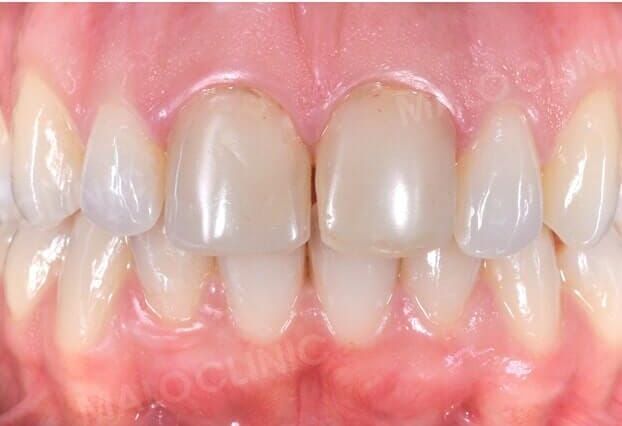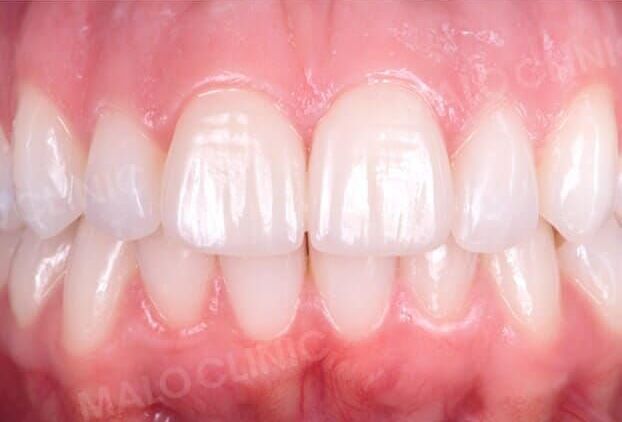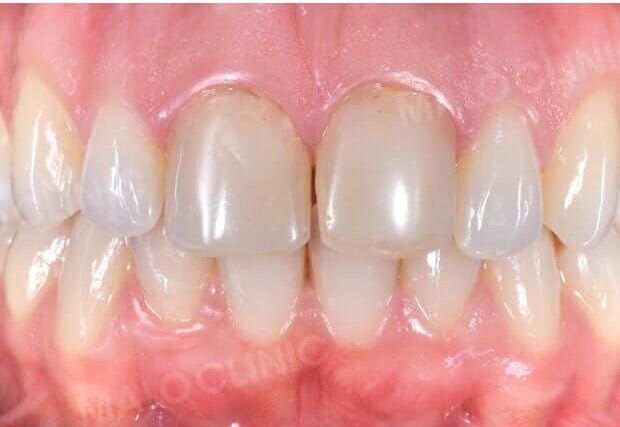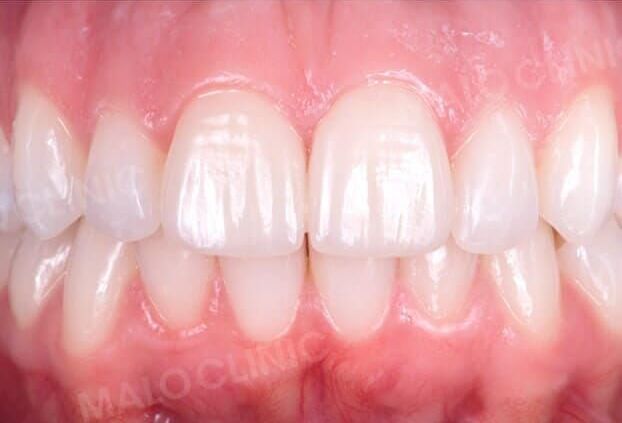Dental Veneers
Our Clinical Team is here to help you!
Dental Veneers are suitable for you if:
- You have discolored or stained teeth that don't respond to other whitening treatments.
- You have chipped, cracked or worn teeth that need to be restored.
- You have gaps or spaces between your teeth that you want to close (diastemas).
- You have misaligned or uneven teeth that you want to correct without braces.
- You are looking for a minimally invasive procedure with relatively quick results.
Benefits of Dental Veneers

Improved
smile
Dental veneers can dramatically improve the appearance of your smile, correcting problems such as stained teeth, chipped teeth, worn teeth or irregularly shaped teeth.

Natural
aspect
Dental veneers are designed to look and function like natural teeth, providing a perfect result.

Stain
Resistance
Unlike natural teeth, dental veneers are highly resistant to stains, making them a long-lasting solution for a shiny smile.

Durability
With proper care, dental veneers can last for many years, giving you a beautiful smile that stands the test of time.
How do dental veneers work?
1.
Assessment
An evaluation appointment with a MALO CLINIC dentist, who will assess your oral situation and understand the goals and expectations you have for your smile.
2.
Treatment planning
A personalized treatment plan is created based on your specific needs and the desired result. At this stage, and based on the information gathered during the assessment appointment, parameters such as the color, size and structure of the veneer are defined.
3.
Record
Using the latest digital technology, a 3D image of your teeth is taken, which will serve as the basis for the production of your dental veneers, so that they exactly match the shape and color of your natural teeth.
4.
Mockup
This type of treatment even allows a model of the final result to be created so that the patient can try it on and see it before it is permanently fitted. While your permanent veneers are being produced in the laboratory, these temporary veneers help to protect your teeth.
5.
Placement
When your permanent veneers are ready, your dentist will carefully bond them to your teeth with a special adhesive. In some cases, the surface of the tooth enamel may also need to be slightly worn down to compensate for the space the veneer will take up and to make it easier to attach.
6.
Final adjustments
Your dentist will make all the necessary adjustments to ensure that the dental veneers fit perfectly and are comfortable.
7.
Maintenance
Regular visits to your dentist and good oral hygiene will help prolong the life of your dental veneers.
What Pathologies can it treat?
Chipped
Teeth
It is a condition in which part of the tooth fractures or splits due to trauma, wear or other causes. This can result in discomfort, sensitivity and even compromise the aesthetics of the smile.
Spacing between teeth (diastemas)
A condition in which there is visible spacing between the teeth, especially between the front teeth. These spaces can vary in size and are most often seen between the upper central teeth, although they can also occur in other areas of the mouth.
The presence of diastemas can affect the aesthetics of your smile and your self-confidence. In addition, in some cases, diastemas can predispose you to oral health problems such as gingivitis and food build-up.
Stained
Teeth
Teeth with color changes or stains that don't respond to traditional whitening treatments can be a source of discomfort and embarrassment. These stains can be caused by a variety of factors, including intrinsic pigmentation, trauma, excessive use of fluoride, certain medications or root canal treatments.
Clinical Cases
Our Clinical Team is here to help you!
Clinical Team
FAQ's
1. I've had dental veneers fitted, can I eat all kinds of food?
As with any type of restoration or even natural teeth, very hard foods should be avoided, as there is a risk of fractures. In the case of composite veneers, as they are more susceptible to discoloration, pigmenting foods such as coffee, tea, red wine or berries should also be avoided.
2. How many years do dental veneers last?
Despite their delicate appearance, dental veneers are very strong and long-lasting. Once bonded, the tooth becomes as strong or stronger than a tooth without a veneer. The two become one and are generally impossible to remove.
The maintenance and daily oral hygiene of teeth rehabilitated with veneers is no different from that of natural teeth: in addition to correct daily oral hygiene, patients should visit their dentist or oral hygienist every six months. A preventive measure that can help increase the long-term success of this type of rehabilitation is the use of a relaxation drip at night. We would also remind you that tobacco is a substance that can compromise the aesthetic quality of your dental veneers. On average, dental veneers last around 15 years.
3. What is the difference between composite veneers and ceramic veneers?
Regarding the material, ceramic is considered the best option for producing veneers when compared to composite, since composite has less longevity due to its susceptibility to discoloration, wear, fractures and plaque accumulation - which ultimately affects the long-term aesthetic result. Ceramic veneers, due to their aesthetic appearance as well as their durability, have become the procedure of choice when it comes to the aesthetic rehabilitation of so-called front teeth.
4. How much does a dental veneer cost?
Because each case is unique, the price will depend on the treatment plan best suited to your clinical situation and the goals you want to achieve. Make an appointment for an assessment with our clinical team and you will receive a treatment plan tailored to your case and the corresponding budget.
Agreements and partnerships
Our Clinical Team is here to help you!














